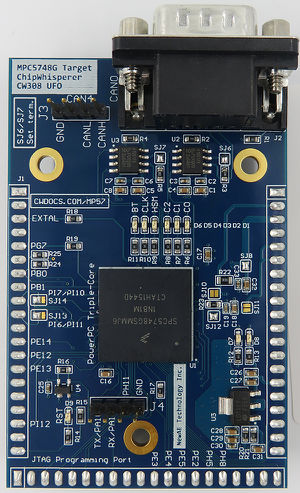CW308T-MPC5748G
This requires a programmer for the MPC5748G to reload code.
| CW308T-MPC5748G | |
|---|---|
 | |
| Target Device | NXP MPC5748G |
| Target Architecture | PowerPC, Triple-Core |
| Hardware Crypto | Possible |
The MPC5748G target uses the NXP MPC5748G device, which is a triple-core PowerPC microcontroller for automotive applications. This target board has a number of interesting features including:
- Two CAN interfaces, with with DB9.
- Two serial ports (usable as LIN).
- Various solder jumpers for variety of power analysis options.
Intended Usage
Demo Application
The demo application provides examples of:
- Using serial interface (implements Simple-Serial).
- Using CAN interface.
- Enabling all three cores, and communicating between cores with shared memory.
- Running software AES on main core.
- Running password-check (XOR) on main core.
- Setup of clock network for using external clock from ChipWhisperer.
Offered Variants
The product is available in one variant:
- The "NORMAL" variant which is normally shipped (i.e., P/N NAE-CW308T-MPC5748G). This variant has the following setup:
- HSM is not programmed. We cannot provide details on this usage without a NDA.
- The four OTP password groups have been programmed with 4 known passwords you can use for experimentation.
- Device lifecycle is progressed to the "OEM Production" stage. This will prevent you from doing certain updates to the memory, but for most "normal" uses will not prevent reloading of code etc. This progression is done since it is required to use the password/censorship features.
- The demo application is loaded which includes ability to execute code loaded over the serial port and change/read memory locations (but is NOT a full bootloader).
- Device censorship is disabled (this can be turned on using an external programmer).
- The JTAG port has a known password, but is not locked (this can be turned on using an external programmer or via load functions).
Programming
The device is designed to use an external programmer for reflashing, as it does not include a bootloader. The suggested programmer (scripts are provided in the GIT repo) is the PE-Micro which requires purchasing:
- PEMicro USB Multilink or USB Mulilink FX
- PEMicro PROGPPCNEXUS (Programmer SW only) or PEMicro PowerPC Nexus Development Kit (includes Debugger). You may be able to use a GDB server instead but we haven't tested this.
You can use the MPC5748G-DEVKIT instead with invasive hardware mods - the devkit has an on-board programmer, but it uses buffers such it cannot be routed to any available header pins. You would need to solder small jumper wires to small SMD pins for this to work. However as the dev-kit is very cheap, it may be worthwhile to scrap one and convert into an external programmer.
HSM Usage
The device features a HSM, but details of this are under NDA and cannot be made public.
Random Useful Tips
= S32DS Version
It is recommended to use S32DS Version 2017 or later. The default linker scripts changed slightly in such a way that old scripts don't work with the new version, and thus all scripts have been updated to work with the latest release.
Disassembling Source
If you are having trouble debugging, it can be useful to read out a memory segment and dissassemble it. This is possible with the included S32DS tools. The following shows the required command line:
E:\nxp\S32DS_Power_v2017.R1\Cross_Tools\powerpc-eabivle-4_9\bin>powerpc-eabivle-objdump.exe -mpowerpc -Me200z4 -D -b srec -EB MPC5748G.s19 > MPC5748G.txt